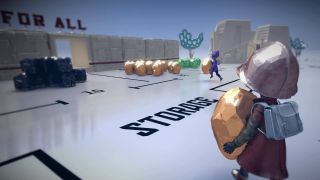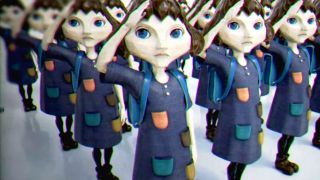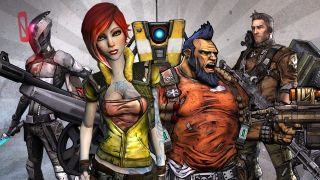It’s always a strange event when an online world dies. People come together, make friends, form relationships and build a life of sorts in a game, sometimes over years. Then, in an instant, it’s gone. No gentle exit or release, just a brutal server error and a black screen. Everything ceases to exists. The moment PlayStation Home shut down is a particularly brutal example:
It’s an end that’s coming to The Tomorrow Children, Sony and Q-Games’ odd little town building online… thing. If you’ve not played it then it’s an strange experience to explain. Set in a world where “a disastrous experiment has melted humanity's consciousness into a dismal mass known as the Void,” players share a Soviet-themed town and work together to make it better. That might involve mining bizarre statues to collect resources, running on treadmills to generate power, fighting monsters and more. It’s seriously, seriously weird.
It’s often hard work and, like actual communism, leaves its workers not sure how they’re benefiting personally. But it is intriguing, beautiful and, while it never really grew a huge audience, has a small group of passionate fans brought together by its odd camaraderie and group goals. People who’ve been toiling away for the betterment of its shared world, who are now staring down the barrel of very precisely dated apocalypse: November 1.
Just because it wasn’t a huge success doesn’t mean it wasn’t loved. I’ve spoken to numerous people on The Tomorrow Children reddit who still can’t believe it’s all going to end. “It feels like knowing the exact date of one of your loved one's death,” thetzx tells me (English isn’t their first language). “Waiting for it to come day-by-day, and lose it forever after that day, is giving very much pain. Because, your hands are tied and cannot do anything about it. Unbelievable in all sorts of ways!”
For those who bought into The Tomorrow Children's odd little world, there was a lot to love and losing it is going to be hard. “I will miss playing with my fellow comrades the most. The social aspect,” TheLostElement tells me. It’s exactly that social element that’s making a lot of people feel loss around the game’s approaching end. One player, Kendakari, admits The Tomorrow Children’s focus on collecting and mining means, “it's a grindy semi-builder” but one that focuses on teamwork and community contribution. “Once players figure out what the town needs, they fall into roles without a word,” they say. “It's a beautiful feeling when you've got a small team running a town like clock work. If you read the sub[reddit], a lot of us are about camaraderie and helping each other for the good of the town.”
Actions not words
Oddly, though, it’s a game that doesn’t let you communicate with other people: you can simply see them around you. The only real way to interact is through work, and bettering the town for everyone. It’s The Tomorrow Children's unusual sense of simultaneous isolation and collaboration that seems to appeal to many of its players. “You fall into a pace with one or two random strangers,” explains Kendakari. “There's no mics, no messages, but two or three of you manage to work in perfect conjunction, to keep the town from declining. In no other game have I made so many friends that I actually return to play with.”
GreatSunBro similarly points out the unspoken teamwork as one of The Tomorrow Children’s strange draws. “The most common group effort is you see several people sorting resources at the bus stop.” In the game the mines are far away from the towns and only reachable by public transport, leaving players to load up rock chunks onto busses which then carry them in. When they arrive they’re simply dropped off and have to be placed in specific areas to be ‘collected.’ It’s something I did a lot when mining was boring or too treacherous (if you stray from safe areas you sink into the void, too far from light and you take damage). Instead I’ve just carried stuff and sorted into piles. I’m helping!

There’s no discussion or communication: people just get on with it. “There is a whole bunch of resources and everyone is sorting,” GreatSunBro explains. It’s everyone pitching in without complaint that makes the world such a special place for them. “There are times when you are mining on a remote part of the island, in the dark with only a lantern, and throwing resources off the side to be collected by other players. You can't really see them, but you know someone is there. It is this contrast between ‘lonely’ and ‘working together’ that is very appealing in a multiplayer video game.”
"Other games have grind but you're grinding for yourself. In The Tomorrow Children you grind for the good of the town"
Kendakari
Time and time again players I spoke to bring up this sense of unspoken community. The Tomorrow Children is a game about helping others, with no specific individual reward. Instead everything you do betters the world you all inhabit. It more or less gamifies altruism, and in doing so brings out the best in people online - an environment not usually known for that. “Other games have grind but you're grinding for yourself, because you're trying to level up or gain something you want,” says Kendakari. “In The Tomorrow Children you grind for the good of the town. I have always disliked the electricity mini game [a button matching challenge that supplies power], but have done it over and over because the town really needed it.”
“[It’s] a calm game,” says thetzx. “There are no opposite teams to crush or kill. There is no opponent to overcome. You can dig, build, defend, create without any stress. Of course, there is a personal goal to be the number 1 comrade in restoring towns. But it does not matter to be in first place or 100th. Every comrade works for the town at the end and have fun, whatever you do within game makes you level up.”
It’s one of the reasons it’s a shame to see it go. It was never going to be huge game - a playable take on communist ideals that looks like a strange cartoon just doesn’t have much mainstream appeal - and, as director Dylan Cuthbert tweeted when talking about the game’s closure, online games are expensive and hard work. It’s not easy to pull off with a small player base.
A few reasons,but primarily it is just a lot of hard work keeping a game like this running, constantly creating content and getting users inJuly 6, 2017
While it is/was around though it did at least prove that you can make an online space about being nice. Okay, the inability to communicate or actually do anything bad sort of forces your hand, but no one seems to mind. “Like all multiplayer games the community develops rules and behavioural norms,” says GreatSonBro. “The Tomorrow Children strongly encourages cooperation and this results in a community about camaraderie and working toward a common goal.”
And it’s a community preparing to say goodbye. “I will miss playing with my fellow comrades the most,” says TheLostElement. And, while it’s all coming to an end, it sounds like some of its ideas will live on, with Kendakari concluding, “I would say to take a lesson from The Tomorrow Children. Work with your fellow player, not just to benefit yourself but because when everyone helps each other towards a common goal, we all get there easier and faster.”



